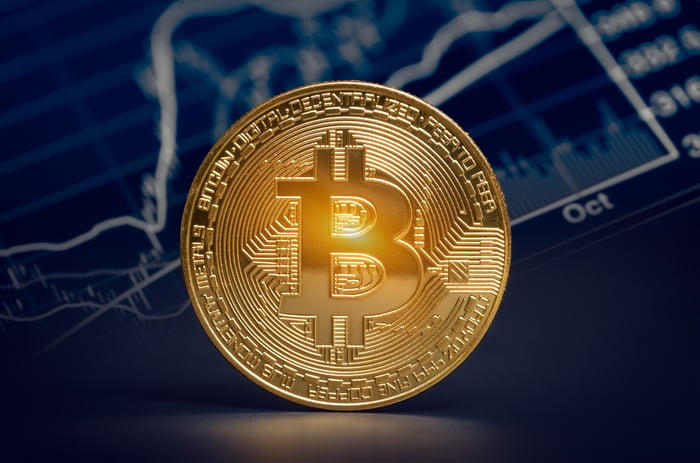For the past two months, Bitcoin (BTC 0.07%) has lived up to its reputation as one of the most volatile assets in the world. After hitting a new all-time high of $73,750 in mid-March, Bitcoin quickly dropped below $57,000 by the end of April.
For now, Bitcoin has recovered nicely to the $62,000 level. But questions still remain about where Bitcoin is headed in 2024. Is Bitcoin overvalued or undervalued at its current price? To answer that question, let's take a closer look at two key catalysts.
Bitcoin ETF inflows
It all starts with the new spot Bitcoin exchange-traded funds (ETFs). For the first four months of 2024, massive investor inflows into these ETFs have led to a huge rally in Bitcoin's price. The new spot Bitcoin ETFs -- led by the iShares Bitcoin Trust (IBIT 3.04%) and the Fidelity Wise Origin Bitcoin Fund -- quickly accumulated more than $30 billion in assets under management. They have found widespread investor acceptance. At one point, the iShares Bitcoin Trust had a 71-day streak of net positive inflows.

Image source: Getty Images.
Admittedly, there has been a noticeable pullback in the amount of new money headed into these ETFs over the past month as the price of Bitcoin drifted lower. But we are now gearing up for what can be thought of as "round two" for these ETFs. According to BlackRock, the issuer of the iShares Bitcoin Trust, the next round of ETF buyers will include three important types of institutional investors: sovereign wealth funds, pension funds, and endowments. Combined, that's going to represent another huge influx of new money into Bitcoin, helping to prop up its price for the foreseeable future.
The halving
The second major reason to buy Bitcoin now is the halving. This event, which took place on April 19, results in the rewards paid out to Bitcoin miners being slashed in half. On the surface, this might not sound like a big deal. But this process sets off a chain reaction of events that (a) boosts the scarcity of Bitcoin and (b) cements its status as a disinflationary asset.
Both of these results are very important for investors. Increasing the perceived scarcity of any asset should lift its price, and it's no different with Bitcoin. Moreover, investors are always clamoring for inflation-resistant assets. When you combine both of these features into a single asset, you should get a fantastic long-term store of value.
For that reason, halving events have historically been very bullish for Bitcoin. After the previous halving (which took place in May 2020), for example, the price of Bitcoin went parabolic. On May 11, 2020, the price of Bitcoin was $8,600. By the end of the year, Bitcoin was trading around $30,000 per coin. The price of Bitcoin would eventually hit a new all-time high of $69,000 in 2021. Given that similar patterns have occurred after halving events in 2012 and 2016, it's easy to see why crypto investors are expecting a repeat performance.
The only problem is that this year's halving has been a bit of a nothing-burger. When it took place in mid-April, Bitcoin was trading at roughly $64,000. More than two weeks later, it's still trading around the $64,000 level. Moreover, there has been a worrisome downdraft to around $57,000 along the way. That was completely unexpected -- the Bitcoin halving is supposed to lead to a higher price, not a lower price!
Don't believe the hype?
And that leads me to an important warning for equity investors who are new to crypto. Bitcoin can be a riskier investment than buying an individual stock, primarily due to its volatility. There have been plenty of reminders of this in 2024, with Bitcoin moving up or down 10% in a single day. And keep in mind, some of the smartest investors in the world -- including billionaire Warren Buffett -- say they have no intention of ever buying Bitcoin.
That being said, it's hard not to see the new spot Bitcoin ETFs as a real game-changer. They are democratizing crypto for smaller retail investors, while simultaneously making Bitcoin mainstream enough for even the biggest institutional investors. As long as investors of all sizes continue to plow their money into these ETFs, I'm going to buy Bitcoin like there's no tomorrow.





